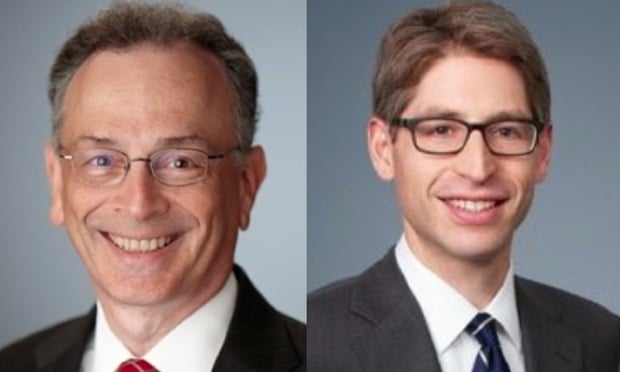Edward M Spiro

June 14, 2021 | New York Law Journal
Limited-Scope Representations in Civil CasesIn civil cases, where counsel is not guaranteed and litigants often cannot afford a full-scope attorney, commentators, bar associations, and courts have recognized the value of limited-scope representations. In this edition of their Southern District Civil Practice Roundup, Edward M. Spiro and Christopher B. Harwood explore 'Villar v. City of New York', in which Southern District Judge Jed S. Rakoff recently authorized a limited-scope representation, issuing a detailed order specifying the precise nature and extent of the limited-scope representation.
By Edward M. Spiro and Christopher B. Harwood
8 minute read

April 19, 2021 | New York Law Journal
Thorny Issues Raised by Third-Party Discovery in ArbitrationIn this edition of their Southern District Civil Practice Roundup, Edward M. Spiro and Christopher B. Harwood discuss the nuanced analysis of third-party discovery issues in 'Broumand v. Joseph', a subpoena enforcement proceeding where the out-of-state respondents successfully resisted arbitral subpoenas.
By Edward M. Spiro and Christopher B. Harwood
10 minute read

February 16, 2021 | New York Law Journal
The Federal Arbitration Act Precludes New York From Exempting Claims From ArbitrationIn this edition of their Southern District Civil Practice Roundup, Edward M. Spiro and Christopher B. Harwood discuss a recent case which demonstrates that, due to the FAA's national policy favoring arbitration, absent exceptional circumstances a party will not be able to avoid its prior agreement to arbitrate a claim subject to the FAA.
By Edward M. Spiro and Christopher B. Harwood
11 minute read

December 14, 2020 | New York Law Journal
Obtaining Discovery Relating to a Confidential Private MediationWhile courts generally cloak mediation with a fair degree of confidentiality, this protection is not absolute and courts have disagreed whether a party seeking discovery of materials relating to a confidential private mediation (as distinct from a court-sponsored mediation) must make a heightened showing of need. In this edition of their Southern District Civil Practice Roundup, Edward M. Spiro and Christopher B. Harwood discuss a recent case that addressed this issue.
By Edward M. Spiro and Christopher B. Harwood
9 minute read

October 19, 2020 | New York Law Journal
Remote Depositions: The New NormalSince the start of the COVID-19 pandemic, parties have had to adjust their approach to litigation—including by conducting remote depositions—to account for the new normal, writes Southern District Civil Practice Roundup columnists Edward M. Spiro and Christopher B. Harwood.
By Edward M. Spiro and Christopher B. Harwood
9 minute read

August 17, 2020 | New York Law Journal
Discovery of Absent Class Members Prior to Class CertificationThe named plaintiffs in a putative class action must offer affirmative evidence—beyond just the allegations in their complaint—sufficient to satisfy each of the elements of Federal Rule of Civil Procedure 23, write Edward M. Spiro and Christopher B. Harwood in their Southern District Civil Practice Roundup column.
By Edward M. Spiro and Christopher B. Harwood
9 minute read

June 15, 2020 | New York Law Journal
The Limits of Withholding Expert-Generated MaterialsSouthern District Magistrate Judge Gabriel W. Gorenstein rejected the plaintiff's claim that a memorandum that his expert had prepared in advance of the expert's deposition—on his own accord and absent any instruction from counsel—qualified for protection as a draft report or an expert-attorney communication. In this edition of their Southern District Civil Practice Roundup, Edward M. Spiro and Christopher B. Harwood discuss this case, Hernandez v. The Office of the Commissioner of Baseball.
By Edward M. Spiro and Christopher B. Harwood
8 minute read

April 20, 2020 | New York Law Journal
Obtaining Discovery From a Foreign Corporation Through Its Domestic AffiliateParties to civil litigation often seek to obtain records held by foreign companies by subpoenaing their U.S. subsidiaries or affiliates. In such circumstances, the subpoenaing party must demonstrate that a close relationship exists between the foreign and domestic entities. In this edition of their Southern District Civil Practice Roundup, Edward M. Spiro and Christopher B. Harwood discuss a recent case involving this issue.
By Edward M. Spiro and Christopher B. Harwood
10 minute read

February 14, 2020 | New York Law Journal
ICE Confronts the Privilege Against Courthouse Civil ArrestsIn New York state over the last two years, ICE has increased its courthouse civil arrests of undocumented and other aliens by more than 1700 percent. In response, the state of New York and the Kings Country DA filed suit against ICE on a variety of grounds—including because it violates the privilege against courthouse civil arrests—as well as an injunction barring ICE from conducting such arrests. In this edition of their Southern District Civil Practice Roundup, Edward M. Spiro and Christopher B. Harwood discuss the court's recent denial of ICE's motion to dismiss the lawsuit.
By Edward M. Spiro and Christopher B. Harwood
11 minute read

December 16, 2019 | New York Law Journal
Personal Jurisdiction Requirements in FLSA Collective ActionsThe FLSA provides a mechanism for similarly-situated employees to join together and pursue a nationwide collective action against their employer. If the court adjudicating the action lacks general personal jurisdiction over the employer, however, there exists an unsettled issue: Does each employee have to establish that the court has specific personal jurisdiction over the employer with respect to that employee's FLSA claim? In their Southern District Civil Practice Roundup, Edward M. Spiro and Christopher B. Harwood discuss a recent case addressing this open issue.
By Edward M. Spiro and Christopher B. Harwood
11 minute read
More from ALM
- Legal Speak at General Counsel Conference East 2024: Match Group's Katie Dugan & Herrick's Carol Goodman 1 minute read
- Legal Speak at General Counsel Conference East 2024: Eric Wall, Executive VP, Syllo 1 minute read
- Legal Speak at General Counsel Conference East 2024: Virginia Griffith, Director of Business Development at OutsideGC 1 minute read



